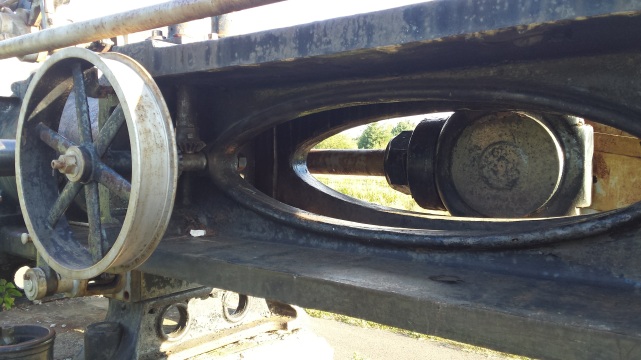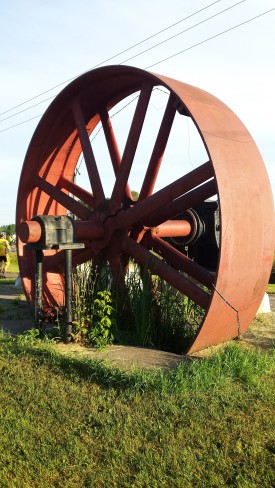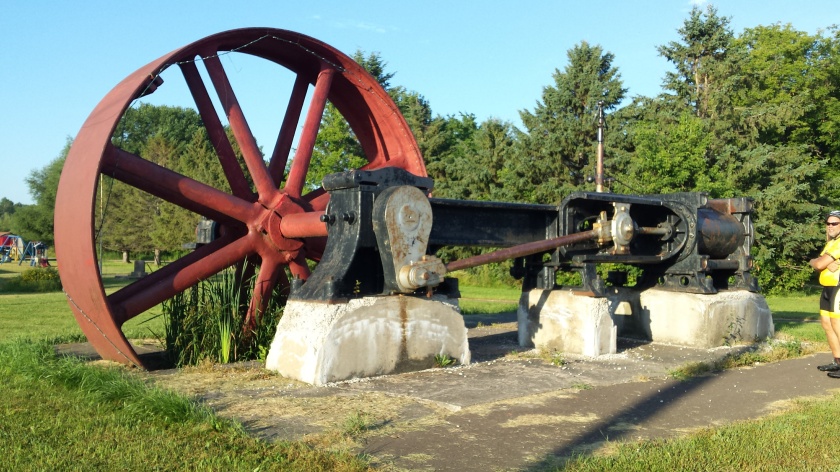
Domino Effect.
A break in routine should not be a big deal. Little did I expect the domino effect it would create. Given the strenuous nature of the activity I should have had some inkling.
I was the last of 85 cyclists to leave camp that morning. In hindsight I should have left later. Being the last rider did not concern me as we were scheduled to meet at the 120 km point in the century ride for a photo op. The midpoint was a milestone, an occasion not to be overlooked. It had been 3490 km since we had dipped our tires in the Pacific Ocean, with 3490 km to go before we would dip our tires in the Atlantic Ocean.
I arrived at the midpoint with a little over an hour to spare. I was a great opportunity to take in a nap… well, more to the point, a nap just happens when I relax after being very active for a few hours.
Failed recovery

After the photo op I completed the last 40 km of the century ride for the day. With the long break in the early afternoon and the heat I arrived in camp knowing that my recovery protocol was essential. I couldn’t afford any short cuts or missed steps today.
This is where a seemingly very good day began to unravel. I didn’t have sufficient time for the full recovery protocol. I had set up my tent and prepared my recovery liquids as expected.
About forty minutes into my recovery time, supper time was announced. I had relaxed a bit, but had not had the benefit of a nap (a key element for brain recovery). The nap at the midpoint was to blame. I decided to get up and head over to the pavilion some 200 meter away. Missing supper was not a good option.
My walking was very slow and difficult, not a good sign. As I approached the pavilion with almost a hundred people engaged in animated discussions I looked for an empty spot near the edgge. No luck. I knew I couldn’t take the level of noise in the middle of the pavilion.
I chose a picnic table about 30 feet from the pavilion. By this time, the effort of walking, the unsuccessful attempt to find seating, added to my sensory overload, further reducing my functioning to the bare essentials. I sat down at the picnic table in tears.
The other term that is used instead of sensory overload is the term flooding.
Shortly one of the support drivers came over, having decided something was amiss. She asked me what was wrong. As I was unable to say anything coherent, she followed up with insisting that I tell her what was going on with me. Good intentions but the last thing I needed was to be flooded with questions. My brain was too fatigued. I didn’t need help. I just needed a quiet place with no questions adding to the flooding.
A second person came over out of a sense of caring. He asked me a few questions further adding to my flooding. Again, I was not able to give a coherent response. He suggested I move over to the group not wanting me to feel isolated. He insisted I was among friends and didn’t need to shrink away from them.
Had I decided I felt too vulnerable in my condition I would have foregone supper and remained inside the safety in my tent. I had chosen to join the group because I trusted this group of people based on the generous support I had experienced earlier in the tour.
I managed to convey that I simply needed a quiet place. In response the fellow decided he would join me for supper and just wouldn’t talk so I would have the quiet space I needed. An interesting choice for which I had no objection.
While I was eating my supper a kitchen staff member came over to me and simply put her arm around me. No questions. No need to know what was happening with me. Without adding to my flooding, I could simply convey my appreciation by putting my arm around her. No need for words, yet an unambiguous sharing of support and appreciation.
After thoughts

I have meanwhile arranged for an advocate to step in should I have another situation of sensory overload or flooding. I would simply refer the well meaning help to my advocate so that attempts to help me doesn’t add to my flooding.
Once again, I have stumbled across a situation that is hard to plan for. I did not have my regular support people near by. It’s just not possible to plan for all eventualities. Can’t be done. How does one plan for the unexpected?
For most people it’s hard to understand how to deal with someone who is neurologically atypical. Their experience with neuro-atypcial people might be rare or non-existent. Trying to help becomes counter productive. Without some careful reflection, the situation can continue into a downward spiral when the necessary answers or responses aren’t forthcoming.
In thinking aloud, I do wonder whose needs are being met with the questions that were put to me. What information was essential to my well-being at that moment?
Suggested guidelines
When someone is experiencing ‘sensory overload’, or ‘flooding’ or severe neuro fatigue, it is most helpful to keep things simple. My suggestion is to focus on whether the person is in a crisis that would require emergency action. The two most helpful questions would be:
1. Are you in pain?
2. Do you need help?
Both of these questions can be simply and clearly answered with a nod or shake of the head.
Some helpful questions could be:
1. Would you like me to keep you company?
2. Are you fine where you are now?
These questions while being less intrusive can be just as effective in assessing what help is needed with neurologically typical people as well.
Comedy
One way to determine the difference between a person who is upset or distraught as opposed to experiencing sensory overload or flooding is to use humour. It might seem strange to use humour when a person is in tears. A person who is experiencing sensory overload or flooding is not able to respond to humour. Since the key purpose of the intervention is to determine whether additional help is needed, using humour would not be considered inconsiderate or out of place.


Reblogged this on yarn and pencil and commented:
I’ve only just discovered ‘Living in God’s pocket. This is such a helpful blog post that I want to re blog it. Thanks Jasper.
LikeLiked by 1 person
Thanks for sharing my blog entry. Participating in a cross Canada cycling tour has been a learning experience as part of living with ABI. Also great to be part of a charity ride that is funding some very effective projects that end the cycle of poverty for many people.
LikeLike
You’re welcome Jasper 🙂
LikeLike